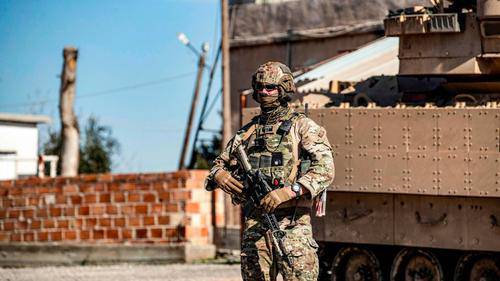
Iranian proxies in Iraq and Syria hindering US fight against the Islamic State terrorist group
The US Defence Department inspector general says proxies allied with Iran and the Assad regime in both Syria and Iraq are posing “significant security threats” to the US-led coalition’s mission against ISIS.
“Militia groups seeking to pressure a US troop withdrawal from the country presented the biggest threat to coalition forces,” said the Pentagon’s latest quarterly report, released on Wednesday.
“Several Iranian-aligned militias, including some incorporated into the Popular Mobilisation Forces, remain hostile towards the US troop presence.”
The report confirmed the drop in US troops in Iraq from about 3,000 to 2,500, finalised on January 15, 2021.
The Pentagon’s report mentioned acts of harassment in Syria.
“Coalition forces continued to operate in a complex security environment in the north-east … in close proximity to Russian, Syrian regime and pro-regime forces, which moved into areas of north-eastern Syria.”
The report, quoting the Defence Intelligence Agency, accused “Iran and its proxies’ continued efforts to support the Syrian regime and to undermine US forces.”
But it also noted that the “Russian military [in Syria] committed fewer violations of established deconfliction protocols”.
The Pentagon said ISIS was continuing as “a cohesive organisation, operating as a low-level insurgency in Iraq and Syria”, making it “largely unchanged this quarter”.
But the report said there had a drop in the number of ISIS fighters.
“One estimate of ISIS strength puts the number of fighters operating in Iraq and Syria at between 8,000 and 16,000, down from between 14,000 to as many as 18,000 in January 2020,” it said.
This drop could be due to security operations in Turkey and improved border control, the report said, quoting a former senior US diplomat.
But clashes between Turkey and the Syrian Democratic Forces near Ayn Issa have undermined the SDF’s fight against ISIS, the report said.
But the report said the SDF were now “more capable of defending critical infrastructure this quarter”.
“Coalition forces continued to advise the SDF on its independent operations against ISIS,” it said.
“However, the SDF, which has no air assets, relied on coalition air support, including for intelligence, surveillance and reconnaissance, and partnered with coalition forces during most of its operations.”
Coalition troops also held operations with units of the Syrian Democratic Forces who protect oil installations.
The report said they “showed greater initiative, competence and independence than in the past”.
In a shift, Pentagon spokesman John Kirby said on Tuesday that US forces in Syria are focused on fighting ISIS and are not guarding oilfields, as was ordered by former president Donald Trump.
Source: The National News





